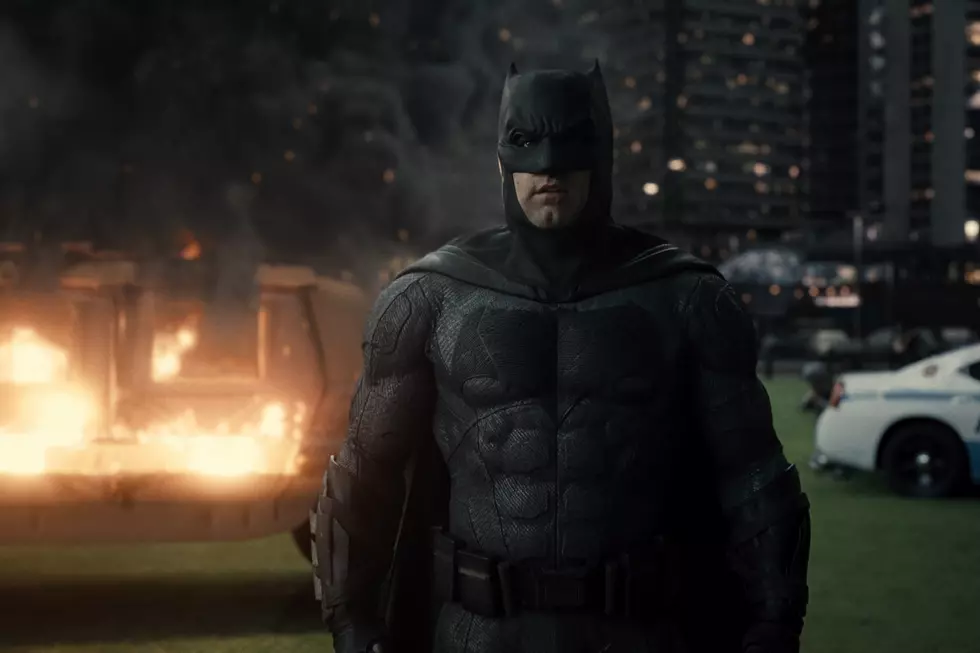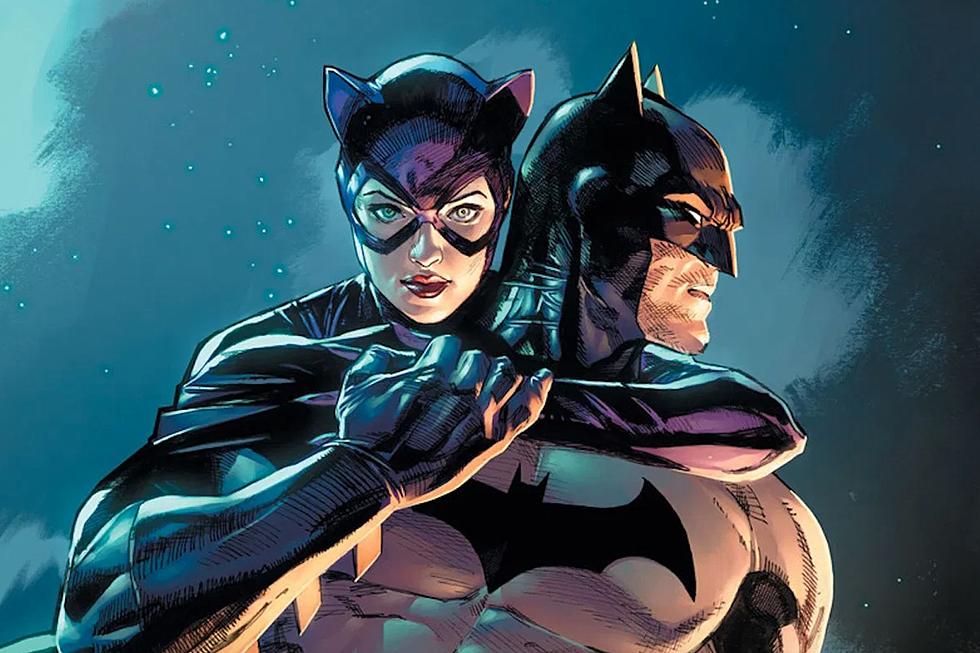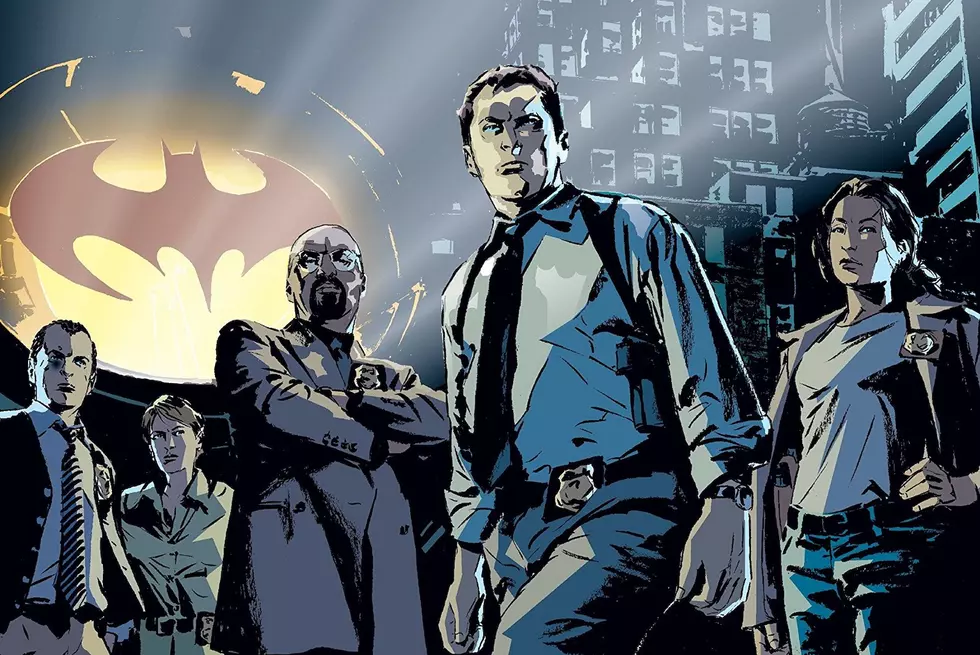
Scott Snyder On ‘Batman: Zero Year – Dark City': The ComicsAlliance Interview, Part Two
In the pages of Batman, Scott Snyder, Greg Capullo, Danny Miki and FCO Plascencia are retelling the origin of Batman for the modern DC Universe with "Zero Year." Told over the course of a year, "Zero Year" is divided in to three arcs, each representing a facet of Gotham City and Batman's growth into a superhero, and it's been wild right from the start. For each arc, ComicsAlliance is going in-depth with Snyder to find out more about how the story came together and what these elements mean, and with "Dark City" finishing just a few weeks ago, it's time once again for our conversation to resume.
In the second part of our interview (you can read the first part here), Snyder and I discuss Batman's relationship with Jim Gordon, the Riddler's role as Batman's first major foe, and just why he has those mutton chops.
ComicsAlliance: We talked about Dr. Death and that conflict, but as you said, this section of the story is more about the relationship between Batman and Jim Gordon. You twist around the origin of Jim Gordon from what's usually established. In the past, whether he was an outsider like in Year One or a GCPD veteran like he is in Batman Begins, Gordon has been this really incorruptible figure from the start. He's the one honest guy, the guy who, if everyone on the police force was like him, there'd be no need for Batman. You, in this story, play with the idea that Batman doesn't trust him because he thinks he's crooked.
Scott Snyder: There have been so many terrific variations on that idea of Gordon being incorruptible that, again, I thought it would be more interesting here if he was vulnerable and human about the choices he had to make. He's not on the take, it wasn't a decision that he made where he was deliberately failing at his job or turning a blind eye because he wanted gifts or money, it's that he wanted desperately for the city to be what he hoped it would be. He wasn't able to look at it for what it really was for a brief moment, so he does fail in that regard.
The challenge was to try to take all these elements and do them in a way that felt personal to me. I could really relate to hte idea of a Bruce who trusts nobody, who's in it just himself, and is this angry, rebellious punk vigilante who's just basically like "I'm not trusting anybody, especially this asshole. He wasn't there the night my parents died." The lesson that Bruce needs to learn there, for me, is poignant. It hits a nerve, personally. So I felt that would be the best way to go with Gordon here, even though it means rolling back some of the stories that I adore.
That's always the thing that freaks you out, but I hope the truest way that we can honor those stories, like Long Halloween, Year One, The Man Who Laughs, the ones I can see myself overwriting, is that they overwrote what came before and were so about making Batman not just personal to the writer, but modern. They were vibrant and didn't look like what you'd seen before. I hope that's enough to honor those stories, because they blazed a different trail.
CA: That was the one thing that I could really see you getting hate mail over.
SS: I did, actually. I got a lot of angry mail before we revealed the softening of that idea that he was corrupt. The first couple issues, where it looks like he is, I got a lot of hate tweets and Facebook messages, stuff like "You've ruined the origin!"
CA: That's what happens when you take a shot at everybody's dad.
SS: I know! Then we revealed that he wasn't so bad, and I feel like I was forgiven, because I didn't get any more hate mail once that issue came out. It mostly stopped.
CA: I know you're sick of it, but there's no getting around comparing "Zero Year" to Year One, and I love the idea that something as realistic as bent cops beating Gordon with baseball bats in a parking garage is now replaced with a crazy dog fight in the back of a dry cleaner.
SS: I honestly had trouble. A lot of the time, you walk the line where it's like, do you really want to retread the emotional beats, even if you have a different way of doing them? Do you want to just cut entirely away? Do you want to show the bat coming through the window, or something entirely different? Sometimes it feels like yes, that's what you want to do with these moments, and then sometimes it feels like you're going too far away from the core. With Jim Gordon, I felt like I needed a moment that was dramatic, when he realized what he had done was wrong, and that he was trying to make up for it, but it was too late. It became about doing something different. I couldn't do cops beating him up. I couldn't do something violently realistic. It had to be something that was almost hellishly over the top.
I'm really happy with how that came out, but it's so difficult to know how it's going to read. To figure it out, you just have to go with your gut.
CA: I'm really drawn to Batman stories that have that sense of theatricality. I mean, it's all over Morrison's run, which we're both big fans of. I mean, it's dramatic, but I can't help but laugh when Batman bench-presses his way out of his own grave in R.I.P.
SS: With Grant, there's always such a great sense of fun. Watching that run unfold, with ninja Man-Bats, he's one of my idols. Seeing how much joy and fanboy moments -- and crazy moments -- that he could bring to the character was really inspiring in that regard. To realize that you can still get to ideas that are personally important to you, the ideas and emotions of Batman, the psychological aspects, you can do that and still have every issue have huge moments of color and fun. It's easy to forget, and seeing Grant's work in particular, you remember very quickly.
CA: The thing I really remember about how Batman and Gordon's relationship turns out is that you have this second arc that's your big Empire Strikes Back moment where Batman loses. It's a big failure -- Gotham City is essentially destroyed as the first thing that happens to Batman -- and he takes the blame for it himself. He talks about how it's his fault because he didn't trust Gordon.
SS: He didn't take Alfred's call back in the day, he didn't let anybody in. "It's all me, I was coming at this the wrong way, from the wrong angle, the wrong emotional fuel was pushing me."
CA: How much of that was you wanting to make sure the groundwork was there for Batman as a character who was built around family? It's something I've written about before, how at his heart, he's based around family, the family that's taken away with him that provides his initial motivation, then watching him grown and become a father figure himself.
SS: Exactly. Our Joker story, Death of the Family, was literally about becoming a father and the doubts you have as a father, of children that are in danger in the real world, wishing that you didn't worry about them. That's what Joker is saying, that you become old because you worry about these people and that they make you human. In making you human, they make you slow and weak and ephemeral. You're no longer the legend that you are when you fight us.
The whole run for me is a lot about Batman coming to terms with the idea that he's not just mortal, but he's getting older. There's a sense of humility about that stuff that runs through "Court of Owls," Joker, and this too. Alfred is really the father figure, and he repairs that relationship in the first part, but to me, Gordon is the big brother. He can't do this without him, as much as he likes to think he can. I always felt that way. Of course you can do Batman where there's no Gordon in a story, but he needs these people. He needs allies. It's part of what makes him inspiring, too. As much of a loner as he is, he does have people that are family to him.
CA: So with that being the relationship with Gordon that's forged by the end of this arc, the other character who plays a central role in "Dark City" is the Riddler.
SS: Right.
CA: The Riddler's one of my favorites, but I would've never thought about making him the second guy. You have the Joker -- well, you have the Red Hood, and I think we all have a good idea of where that goes. You have Dr. Death, who does not make it out of this story. So the second villain that lasts, the second one who continues and becomes a major Batman villain -- and arguably the first, if we're not counting Red Hood and Joker as the same character -- you went with the Riddler. What was the decision there?
SS: When I was thinking about doing "Zero Year," I thought of having him be the Big Bad mostly because there are a couple of things that felt symbolically right to me. If I was going to make Batman modern to me, there are a couple of things that I thought were the modern fears that he would face in a city, about being a hero today. A lot of them had to do with figuring out these terrible questions about things that seem much bigger and more abstract than the idea of gangs and the way New York seemed to me when I was a kid, with a certain sense of urban decay. Like, you didn't go on the trains because of gangs. Not that those problems are any less, but they were so contained in the city itself, it was that New York had these problems.
Now, I feel like the things that we're frightened of are more because of the times. Maybe it's just from being more connected than we were back then, but you have the sense of large-scale and small-scale terrorism. Everything from climate change to dwindling resources, global economies crashing and running on fumes, all of these things that form this anxiety around the city, that it's going to become post-apocalyptic, some zombie playground. It's all the things that make those stories so popular right now. I wanted a villain that would see these issues, and be able to play off these fears and say "I'm going to turn the city into an extension of all that. Let's make it the nightmare right now. Climate change, it's become ruined, there are no resources, it's cut off from the world. There's no cell service, there's nothing, you're isolated. You are in the riddle that we face nowadays, but sped up and turned into something nightmarishly focused."
That was a great opportunity to use the Riddler in a way that would give him this purpose or philosophy, while all of it's really just masking his narcissism. It's just him saying "I'm the smartest guy in the room, you can't find me or outsmart me," but at least he has this soapbox that would allow me to bring up the things that I think are part of modern anxieties that Batman is up against, and have them physically represented in this nightmarish Gotham.
And on top of that, the other reason is that at his heart, if Batman has a superpower, it's that he's the greatest detective in the world. Figuring out a case is solving a set of empirical clues and getting to the answer in a closed system. It's not that different than a riddle. Having the Riddler challenge him first makes sense, because his superpower is his intelligence, his skills and detection, figuring out whodunnit. That's at the core of what Batman is, and pitting him against someone who says "you're not smart enough" is much scarier than someone who says "you're not strong enough."
There are things I love about him that appear in "Dark Knight, Dark City," there are problems that I have with him in "Hush," and I really enjoyed his stint as a detective in Paul Dini's stuff. He's tricky to use, because on the one hand, he's easy to make really small. He's so fun to use in that small way where he's not the psychopath, he's not out to kill people, that's not what his goal is. He's not a murderous, horrifying person. But at the same time, he's always willing to let people die to prove that he's smarter than anyone else. It's hard. On the one hand, I'm balancing the humor and the narcissism and the fun of watching him out-puzzle people constantly against this really terrifying thing that he's doing in the city, and this large-scale, much bigger than you've seen before plan that he's enacted, while also trying to make that plan colorful on the page so that it doesn't feel too grim and outside the realm of what you'd expect a guy in a green suit with a question mark on the tie to be doing.
CA: Was there any resistance to the idea of wanting to make the Riddler such a major force in Batman's origin?
SS: Not from DC, just from myself. It was really a question of how to bring him back down from that to be the Riddler that we know, and do I want to bring him back down? He has to be, in some ways, because we've seen him. Is it too far from the core to do that? That was the challenge. If you're going to do go that big, the most important thing is to make sure he's coming to all of this from a place of deep, deep narcissism and insecurity, even though ultimately, the way he puts it out there and what he says about his own actions is incredibly articulate, and that Batman can see right through his bulls**t.
I never thought I could do it. It's nerve-wracking. I love the Riddler to death, and my favorite stories are often when he is small, so the idea of understanding him in that way is scary, but I felt like there was a way to do it that was true to core. I had an idea to bring him back down, ultimately, so it was like, all right, go for it.
CA: Was it you or Greg that gave him those mutton chops?
SS: That was Greg.
CA: [Laughs]
SS: I know! I remember seeing it I was like "Mutton chops?" And he was like "They look good, dude. They look good."
We talked a lot about his character before Greg designed him, before he's in costume, even, and some of it will come out in #31. It's close to a couple that I really like, where he's this incredibly smart kid, his father doesn't have any use for that or think anything of it, and how he comes up and uses the Edward Nygma name, becoming this guy behind the scenes who sees all the threads, controlling the fates of others, or at least seeing them. That's why we use the thread metaphor all the time, a web, sitting in the corner. The sense of someone that stands above all of it and sees how it's all going to play out.
So I was talking to Greg, and I'm like, we want him to be kind of peacockish. He's the kind of guy who will wear all green and purple in the office, and when someone makes fun of him for it, he'll come back with "In the animal kingdom, females notice green 33% more than any other color, and in humans it's the most appealing color for blah-blah-blah, so your girlfriend's looking at me, even if she doesn't admit it." So it's that thing where he's completely wrong, but he's also right in a weird way? He's obviously socially inept, he's that guy that nobody wants to spend time with, but he's not wrong in what he says. So Greg was like "let's give him a peacocky look, let's give him the mutton chops." It's that thing that he'd explain to you, it's just a little off.
CA: So you made the Riddler a pickup artist.
SS: Yeah, in his own way. I don't know that I'd go that far...
CA: Now I can't wait to see that guy get punched. I thought the mutton chops were just to contrast with Bruce Wayne's John Cena buzzcut.
SS: The buzzcut was really fun, coming up with that. We went back and forth on how to do it. Greg came up with the better way, I'll fully admit it. I was thinking that Batman would've been injured in the scene with the Red Hood gang, and his head would be shaved for stitches on the side, and he'd shave the whole thing in reaction. Greg was like "No, let's do it like Braveheart, where he just does it as a warrior."
CA: Do you have a favorite moment from "Dark City?"
SS: Honestly, the end is my favorite moment. It was the thing I was most nervous about, having him lose and doing the death in Crime Alley that wouldn't feel reminiscent and would have its own story behind it that would unfold slowly, with Bruce being picked up at the police station by his parents, and this is why they take him to the movie. The culmination of all those things there, when I was writing it, I really felt like... not that we had pulled it off objectively, but I felt good about it. The things that I'd tried to say about Bruce's initial mistakes felt like they were coming together, and Greg's art there is incredible.
Just to give you a little bit of a sense of what Greg brings to the table. We said that what we want is to almost see this happy moment, this possibility, being crossed out, this sense of it being lost even as it's happening, and he was like "what if I make this motif? Wait'll you see it and tell me what you think." If you look at those pages, when they're coming out of the theater, there's an "X" motif. Things are being crossed out, there's something barring the possibility of things happening. Bruce's arms are an X, the parents' hands form an X, there's wires crossed over them in the alley.
His art isn't just evocative and emotionally, thrillingly affecting, it's also so interestingly designed. He brings these layers to the storytelling that make me look amazing half the time, like I thought of all this symbolic stuff that he winds up adding. That section, that sequence is my favorite part. It's the culmination of a lot of things that we were trying to make work in the arc, and I'm really proud of how it came out.
For anyone reading it, thanks again for being so supportive of the story. It means a lot to me, that we just finished this section and it's still doing as well as it's doing. We were so nervous going into it that we're really grateful. The last section, "Wild City," that's starting up, this is the reward for letting us do all this revision on the sacred material. This is the part that's the over-the-top fun. I hope people will check it out.
More From ComicsAlliance









